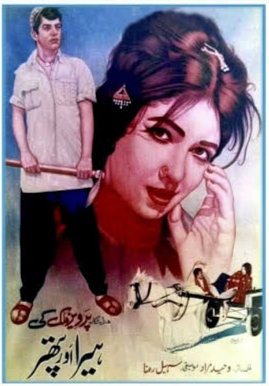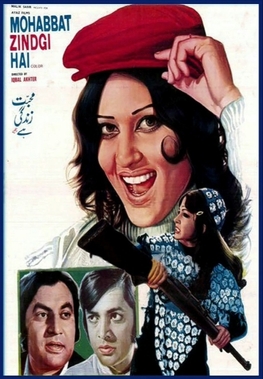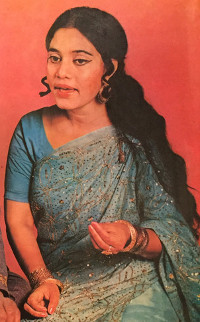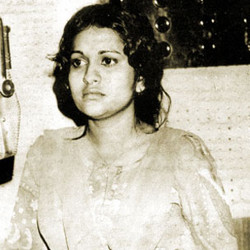Related Research Articles

Khwaja Khurshid Anwar was a Pakistani filmmaker, writer, director and music composer who earned recognition in both India and Pakistan. He is credited as being one of the most original and inventive music directors of his generation. He was the Programme Producer (Music) at (AIR), All India Radio or Akashvani, Delhi in 1939.

Ahmed Rushdi was a versatile Pakistani playback singer and was "an important contributor to the golden age of Pakistani film music." Regarded as one of the greatest singers in South Asia who could sing high tenor notes with ease, he is best known for his versatility and distinctive voice, with complex and dark emotional expressions. Considered as the first pop singer of South Asia, he sang South Asia's first pop song, "Ko Ko Korina", in the 1966 film Armaan.

Naseem Begum, known professionally as Mala, was a Pakistani playback singer of Urdu and Punjabi films.

Sohail Rana is a Pakistani music composer for films and television. He was introduced by actor Waheed Murad in Pakistan film industry and gained popularity when singer Ahmed Rushdi sang his compositions in such films as Armaan and Doraha. He is now based in Canada.

Masood Rana (Urdu: مسعُود رانا), was a Pakistani film playback singer. He began his singing career in 1962 with the film Inqalab, became one of the top male singers in both Urdu and Punjabi films for more than three decades and remained a busy singer until his death in 1995.
Jhoomer is a 1959 Pakistani film directed by Masood Parvez, producer by Khwaja Khurshid Anwar who wrote the screenplay also. The music composition was also done by Anwar and lyrics by Tanvir Naqvi. It stars Musarrat Nazir, Allauddin, Sudhir and Naeem Hashmi.
Nashad was a film composer and music director of Indian and Pakistani film industry. He composed music for Hindi films in the 1940s and 1950s, credited on-screen under the names Nashad and then later migrated to Pakistan in 1964.

Heera Aur Pathar is a 1964 Pakistani Urdu language black-and-white film.

Mohabbat Zindagi Hai is a 1975 Pakistani Urdu-language film directed by Iqbal Akhtar and produced by Begum Riaz. It is a musical romance film starring Mohammad Ali, Zeba, Waheed Murad, Mumtaz, Nayyar Sultana, Qavi Khan, Saqi and Lehri. Waheed Murad played a secondary role and Zeba played a lead role against Mohammad Ali.

Naseeb Apna Apna is a Pakistani Urdu black-and-white film directed by Qamar Zaidi and produced by Waheed Murad. The cast included Waheed Murad, Shabnam, Zamurrud, Tamanna, Nirala and Saqi. The movie became a musical blockbuster and was one of the biggest hits of Shabnam's early career.

Ghulam Mustafa Durrani was an Indian radio drama artist, playback singer, actor and music director.
Irene Perveen also spelled as Irene Parveen is a Pakistani playback singer from the 1960s, who mainly sang for Pakistani films. She gained popularity for her film song, "Tumhi ho mehboob mere" for movie Aaina (1966).
Noel Dias, better known as Saleem Raza, was a Pakistani playback singer. He converted to Islam and started his singing career from Lahore, Pakistan, quickly gaining popularity. Raza was a classically- trained singer and was more famous for singing sad songs. Raza's career suffered due to the rise of singer Ahmed Rushdi in the late 1950s. He left playback singing in 1966 as he lost his popularity with the film composers and moved to Canada where he died in 1983.
Bashir Ahmed was a Pakistani-Bangladeshi playback singer, lyricist, and musician who started his career from Lollywood in the 1960s. He is known for his playback songs in the films Talash (1963) and Darshan (1967). He was awarded Ekushey Padak in 2005 by the Government of Bangladesh and Bangladesh National Film Award for Best Male Playback Singer for his performance in the film Kokhono Megh Kokhono Bristi (2003). He is known as East Pakistan's Ahmed Rushdi because his singing style is inspired by him.
M. Ashraf or Muhammad Ashraf was a Pakistani film composer. In the early 1960s, he first started as one member of the music directors duo of Manzoor – Ashraf in the Pakistan film industry.
Zubaida Khanum was a Pakistani playback singer who recorded over 250 songs during Golden Age of Pakistani film music of 1950s and 1960s. She was considered Pakistani equivalent to Marni Nixon of Hollywood for giving voice to featured actresses in movie musicals.

Moslehuddin was a Pakistani film score composer and music director. He composed music for sixteen Lollywood films besides contributing to Pakistan Television, the BBC, Bengali music and stage and TV shows.

Shamim Nazli, was a Pakistani music director. She composed playback music for movies like Baharein Phir Bhi Ayein Gi (1969) and Bin Badal Barsaat (1975). She was the elder sister of playback singer Mala. She is known to be the only female musician in the history of Lollywood.

Nighat Seema was a Pakistani radio and film singer during the era of 60s and 70s. She is known for singing semi-classical songs, ghazals, and playback singing. She was the mother of music composer Ahsan Ali Taj.

Rubina Badar was a Pakistani radio, TV, and film singer. She is known for her TV song, "Tum Sung Nainan Laagay".
References
- 1 2 3 4 5 6 7 8 9 10 11 Khan, Siraj (26 February 2022). "Naheed Niazi – Pakistan's Forgotten Nightingale". The Friday Times newspaper. Archived from the original on 28 February 2024. Retrieved 23 July 2024.
- 1 2 3 4 5 6 7 8 9 Ummer Siddique (17 July 2010). "Naheed Niazi profile". Cineplot.com website. Archived from the original on 31 August 2021. Retrieved 23 July 2024.
- 1 2 3 4 MariaS (17 December 2012). "Popular female singer of Pakistan: Naheed Niazi". Pakistan 360 degrees website. Archived from the original on 11 September 2016. Retrieved 9 December 2022.
- 1 2 "Film songs of Naheed Niazi". Pakistan Film Magazine website. Archived from the original on 5 May 2017. Retrieved 9 December 2022.
- 1 2 Zafar, Abdul Hafeez (22 February 2014). "ناہید نیازی…50 ء اور60 ء کی دہائی کی منفرد گلوکارہ". Dunya News (in Urdu).
- ↑ Parvez, Amjad (24 April 2019). "سُر اور سُندرتا کا حسین امتزاج". UrduPoint (in Urdu).
- ↑ Latif, Shahid (26 April 2020). "موسیقارمصلح الدین اور پلے بیک سنگر ناہید نیازی". Hum Sab (in Urdu). Retrieved 19 November 2022.